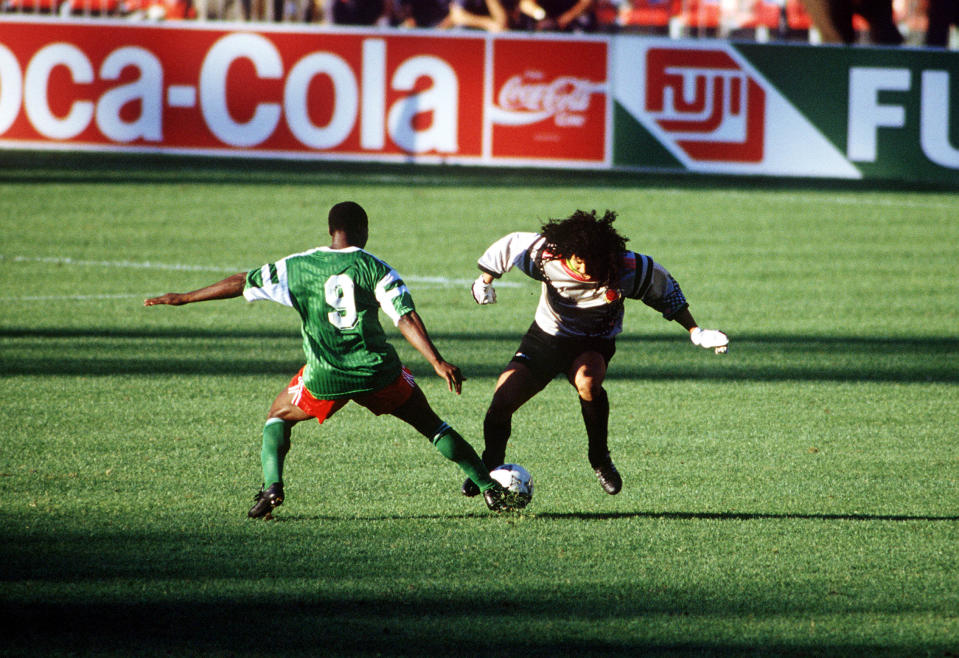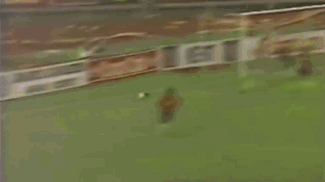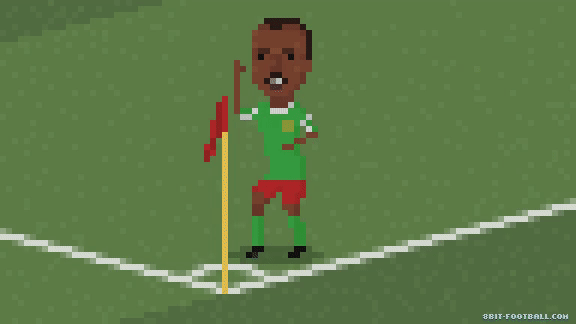Iconic World Cup Moments: Roger Milla picks Rene Higuita's pocket, 1990

It was the kind of mistake those of us who play football make; those of us who love the ball, those who want to keep the ball inside the pitch and not just hit it out.
Rene Higuita, in World in Motion: The Inside Story of Italia ‘90 by Simon Hart
Even with 28 years to reflect on it, Rene Higuita’s attitude to his defining World Cup moment still sits somewhere towards the surprising end of the spectrum between “broken with regret” and “proudly unapologetic”. In many ways, it was a few seconds that summed up what the World Cup is – or at least was – all about: a maverick figure, of whom most of us would only get a quadrennial glimpse, going head-to-head with a breakthrough hero who until recently had been a complete unknown to the mainstream.
Throw in a couple of glorious kits, the oversaturated colour of the TV broadcast and that corner flag, and it has more mystique about it than the last few post-millennial tournaments combined.
To understand Higuita’s enduring defiance about being mugged, 35 yards from his own net, at a crucial moment of a World Cup knockout game, you don’t have to trawl too far back through his personal goalkeeping scrapbook. Just two years earlier – and seven years before his famous “scorpion kick” – Higuita bewildered Wembley by dribbling around Peter Beardsley near the corner flag before scrambling the ball back to the legal safety of his own box.
Then, during the first leg of a tense intercontinental play-off against Israel – with Colombia aiming to progress to their first World Cup in 28 years – Higuita decided things just weren’t perilous enough. To clarify: Higuita decided to dribble halfway up the pitch during a play-off to qualify for the World Cup. Colombia won just 1-0 on aggregate.

“[It] meant we had 11 players instead of 10 able to generate play,” Colombia’s then coach Francisco Maturana said. “So it was a real luxury having Higuita playing within a tactical structure that needed a goalkeeper that led from the back.”
Meanwhile, somewhere in the middle of the Indian Ocean, his would-be nemesis was beginning the most extraordinary journey to a World Cup ever undertaken, one that surely will never be repeated in this hyper-professional era.
READ MORE: World Cup fixtures and TV schedule
READ MORE: 5 of the most lethal groups of death
READ MORE: World Cup 2018 – The team by team guide
READ MORE: World Cup 2018 – England draw ‘favourable’ group after dodging giants
In 1976, fourteen years before he truly announced himself to the world, Roger Milla was voted the best player in African football. Even in 1977, when he moved to France at the age of 25, he might have been considered a late bloomer. In 1988, after Cameroon had reclaimed their Cup of Nations title, Milla was ready to retire: 100,000 people turned up to his tribute match in Yaoundé. A year later, he had left it all behind for a volcanic island in the middle of nowhere.
“It was the best place to rest – nobody would know where I was; I could switch off properly there. It was an island, the air was fresh, and so off I went.”
World Cup Legend : Roger MILLA from Spain 1982 to USA 1994 pic.twitter.com/kIb2tiuK9n
— Old School Panini (@OldSchoolPanini) April 16, 2016
Then, in December 1989, with Cameroon’s form spiralling, president Paul Biya saw Milla return to Cameroon for a former teammate’s testimonial. Still in passable shape, thanks to winning the league and cup double with Reunion’s biggest club, Milla was persuaded/ordered to rejoin the Indomitable Lions for his second World Cup at the age of 38.
By the time he and Higuita shared a pitch in the late afternoon Naples sunshine in the second round of Italia ‘90, Milla had already lifted Cameroon into dreamland without even starting a game. They had beaten Argentina, astonishingly, in the opening game at the San Siro and then taken care of Gheorghe Hagi’s Romania to secure a knockout spot. Colombia, meanwhile, needed a 93rd-minute equaliser against West Germany to squeak through.
Milla’s powder was again kept dry on the bench until the second half. Goalless, the match went to extra time where, in the space of two eternally memorable minutes, Milla and Higuita’s World Cup fortunes collided. First, a cushioned first touch from the supersub, a glide beyond a desperate Colombian leg and then an emphatic finish with his left foot, leaving Higuita – an excellent shot-stopper, it shouldn’t be forgotten – helpless.
Then, the moment that launched a thousand blooper compilations.
“I was lucky because I played with Carlos Valderrama, the Colombia captain, at Montpellier,” Milla told FourFourTwo in 2014. “Through Valderrama I’d seen videos of Higuita dribbling the ball out of his area. I knew if I was quick enough I might be able to take advantage of a mistake…
“…it worked.”
The most remarkable thing about this calamity is how sanguine Higuita’s teammates were afterwards. “Everyone accepted it”, he recalls to Simon Hart in World in Motion, before claiming – apparently in all seriousness – that “if it were today, Barcelona would sign me, and I would be playing there…I was a complete goalkeeper.”

As for Milla, already the World Cup’s oldest-ever goalscorer, his legacy was signed, sealed and delivered via the corner flag. He could easily have left it at that. His second African Player of the Year award arrived, as did an offer to move to England with Fourth Division Walsall (Milla demanded a reasonable £1m, which presumably was the deal-breaker) but then, four years later at USA ’94, he couldn’t resist another go.
SLIDESHOW: The stadiums of the Russian World Cup (Click image below)
Without Higuita, though – jailed for getting involved in a kidnapping in 1993 – Milla had no fall guy to capitalise on. A generation or two later, we are still waiting for a spectacle (and a backstory) anything like as curious as that afternoon in Naples.


